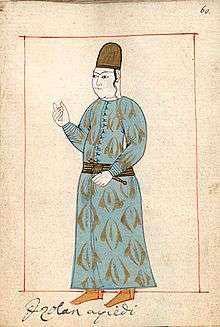Iç oğlan
The term iç oğlan ("Inner [Palace] Boy") refers to the boy servants or pages who had been received from Christian parents in the Balkans and converted, according to the devşirme system in the Ottoman Empire, and who worked in the Enderûn, that is, the Inner Palace, one of the three parts of Topkapı Palace in Istanbul. In other words, they were the Inner Palace servants, the staff serving in the private apartments of the Sultan and his family.

Iç oğlan from the Ralamb Costume Book, 17th century
The same term was also used for certain members of the Janissaries.
As pages the Itch-oglans were trained to be courtiers and also in the arts of administrator and commander, with many being Albanians.[1]
References
- Skendi, Stavro (1967). The Albanian national awakening. Princeton: Princeton University Press. p. 21. ISBN 9781400847761.CS1 maint: ref=harv (link)
Sources
- Ed. (1986). "Ič-Og̲h̲lani̊". The Encyclopedia of Islam, New Edition, Volume III: H–Iram. Leiden and New York: BRILL. p. 1006. ISBN 90-04-08118-6.CS1 maint: ref=harv (link)
This article is issued from Wikipedia. The text is licensed under Creative Commons - Attribution - Sharealike. Additional terms may apply for the media files.